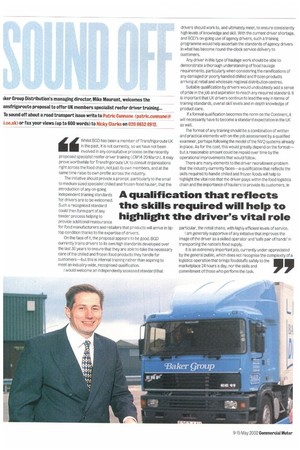6 Whilst BGD has been a member of Transfrigoroute UK
Page 68

If you've noticed an error in this article please click here to report it so we can fix it.
in the past, it is not currently, so we have not been involved in any consultative process on the recently proposed specialist reefer driver training (CM14-20 March). It may prove worthwhile for Transfrigoroute UK to consult organisations right across the food chain, not just its own members, and at the same time raise its own profile across the industry.
The initiative should provide a prompt, particularly to the small to medium sized specialist chilled and frozen-food haulier, that the introduction of any on-going independent training standards for drivers are to be welcomed. Such a recognised standard could then form part of any tender process helping to provide additional reassurance for food manufacturers and retailers that products will arrive in tiptop condition thanks to the expertise of drivers.
On the face of it, the proposal appears to be good. BGD currently trains drivers to its own high standards developed over the last 30 years to ensure that they are able to take the necessary care of the chilled and frozen food products they handle for customers—but this is internal training rather than aspiring to meet an industry-wide, recognised qualification.
I would welcome an independently assessed standard that drivers should work to, and ultimately meet, to ensure consistently high levels of knowledge and skill. With the current driver shortage, and BGD's on-going use of agency drivers, such a training programme would help ascertain the standards of agency drivers in what has become round-the-clock service delivery to customers.
Any driver in this type of haulage work should be able to demonstrate a thorough understanding of food haulage requirements, particularly when considering the ramifications of any damaged or poorly handled chilled and frozen products arriving at retail and wholesale regional distribution centres.
Suitable qualification by drivers would undoubtedly add a sense of pride in the job and aspiration to reach any required standard. it is important that UK drivers continue to lead the way in terms of training standards, overall skill levels and in-depth knowledge of product care.
If a formal qualification becomes the norm on the Continent, it will necessarily have to become a standard expectation in the UK as well.
The format of any training should be a combination of written and practical elements with on-the-job assessment by a qualified examiner, perhaps following the model of the NVQ systems already in place. As for the cost, this would greatly depend on the format— but a reasonable amount could be repaid over time by the operational improvements that would follow.
There are many elements to the driver recruitment problem that the industry currently faces—a qualification that reflects the skills required to handle chilled and frozen foods will help to highlight the vital role that the driver plays within the food logistics chain and the importance of hauliers to provide its customers, in particular, the retail chains, with highly efficient levels of service.
I am generally supportive of any initiative that improves the image of the driver as a skilled operator and 'safe pair of hands' in transporting the nation's food supply.
It is an extremely important job, currently under-appreciated by the general public, which does not recognise the complexity of a logistics operation that brings foodstuffs safely to the marketplace 24 hours a day, nor the skills and commitment of those who perform the task.












































































































































































